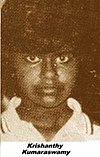Content warning: rape, murder

Krishanthi Kumaraswamy was an A Level student at Chundikili High School who was kidnapped, gang raped and viciously murdered by Sri Lankan soldiers and police officers on September 7th 1996. Three of her family members who went in search of her were also brutally murdered.
The eighteen-year-old was forced to stop at Kaithady Army checkpoint in Jaffna for ‘questioning’, when eleven officers kidnapped and gang raped her before killing her and burying her dismembered body in a ditch. Krishanthi’s 16 year old brother, Pranavan, her mother, Rasamma and a family friend, Kirupakaramoorthy who went in search of Krishanthi were also strangled with a rope and buried in a ditch behind the checkpoint.
The incident, also referred to as the Chemmani massacre, caused international outrage and cast the spotlight back onto the Sri Lankan Army’s atrocious track record of sexual violence and abuses. In 1998, six of the officers involved were sentenced to death and three others sentenced to 20 years of imprisonment for three others were officially announced in 1998, two years after the incident. However many human rights activists believe that the exposure given to this massacre had cloaked countless other rape cases involving the Sri Lankan security forces. Sri Lankan state representatives have used the prosecution as a defence of Sri Lanka’s domestic justice system, in the face of calls for international investigations into genocide and war crimes.
In 2017, Sri Lankan soldiers deployed on a UN peacekeeping mission to Haiti were implicated in a child sex ring, where officers allegedly traded money and food for sex with children as young as 12 years old. Between 2004 and 2007, around 134 Sri Lankan peacekeepers were involved in the exploitation and sexual violence of Haitian children according to an internal UN report, none of whom faced justice in Sri Lanka.
A report released by the International Truth and Justice Project (ITJP) in 2018, which recorded abuses over a period of four years, illustrates that Tamils have excessively been subjected to sexual violence by Sri Lankan security forces during and after the end of the war, with the officers involved taking advantage of ‘‘a culture of impunity’’.
Twenty-four years since the Chemmani massacre, it remains one of the only individual cases to have seen its perpetrators prosecuted, while countless instances of widespread sexual violence by Sri Lankan forces against Tamils have gone unpunished.
